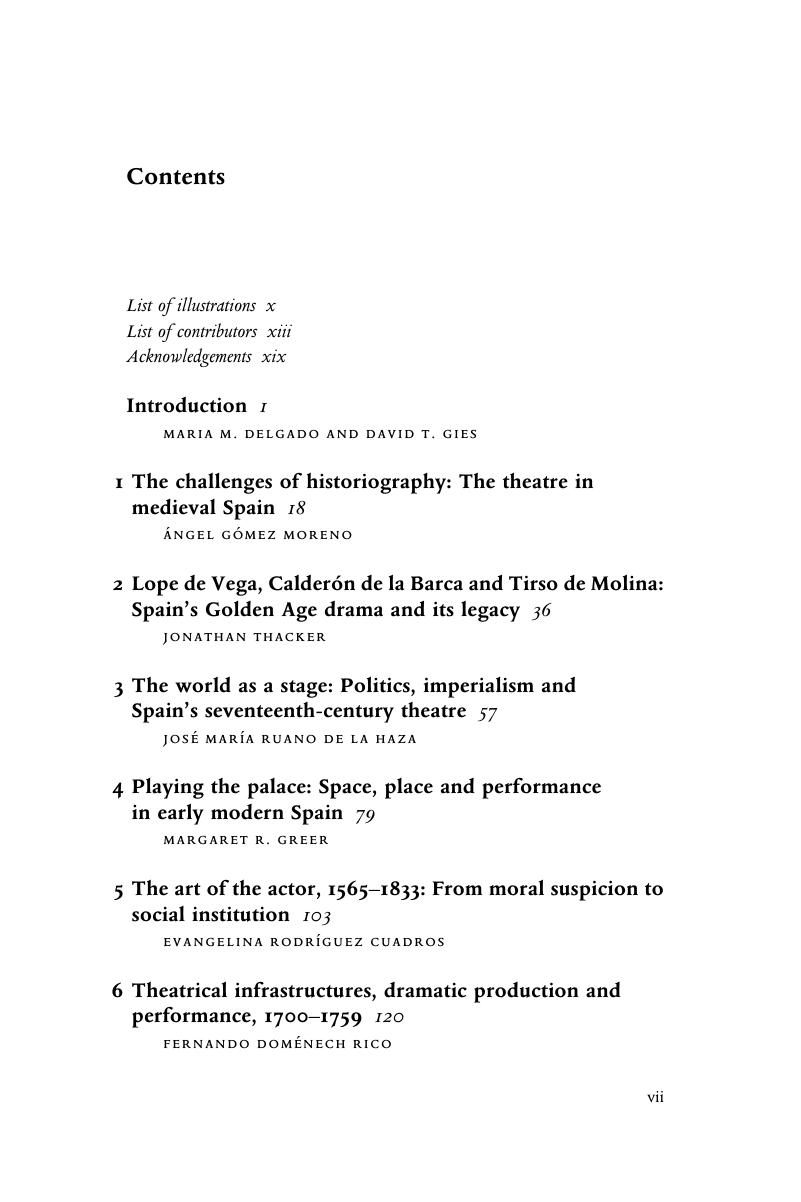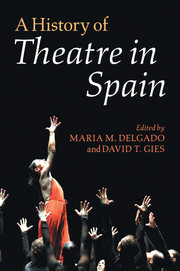Book contents
- Frontmatter
- Contents
- Illustrations
- Contributors
- Acknowledgements
- Introduction
- 1 The challenges of historiography
- 2 Lope de Vega, Calderón de la Barca and Tirso de Molina
- 3 The world as a stage
- 4 Playing the palace
- 5 The art of the actor, 1565–1833
- 6 Theatrical infrastructures, dramatic production and performance, 1700–1759
- 7 Popular theatre and the Spanish stage, 1737–1798
- 8 Theatre of the elites, neoclassicism and the Enlightenment, 1750–1808
- 9 Actors and agency in the modern era, 1801–2010
- 10 Zarzuela
- 11 Nineteenth-century Spanish theatre
- 12 Copyright, buildings, spaces and the nineteenth-century stage
- 13 Modernism and the avant-garde in fin-de-siècle Barcelona and Madrid
- 14 Continuity and innovation in Spanish theatre, 1900–1936
- 15 Theatrical activities during the Spanish Civil War, 1936–1939
- 16 Theatre, colonialism, exile and the Americas
- 17 Theatre under Franco (1939–1975)
- 18 Flamenco
- 19 Nationalism, identity and the theatre across the Spanish state in the democratic era, 1975–2010
- 20 Directors and the Spanish stage, 1823–2010
- 21 This evolution is still ongoing
- 22 Theatre as a process of discovery
- 23 Theatre is the art of the future
- Select bibliography
- Index
Contents
Published online by Cambridge University Press: 05 June 2012
- Frontmatter
- Contents
- Illustrations
- Contributors
- Acknowledgements
- Introduction
- 1 The challenges of historiography
- 2 Lope de Vega, Calderón de la Barca and Tirso de Molina
- 3 The world as a stage
- 4 Playing the palace
- 5 The art of the actor, 1565–1833
- 6 Theatrical infrastructures, dramatic production and performance, 1700–1759
- 7 Popular theatre and the Spanish stage, 1737–1798
- 8 Theatre of the elites, neoclassicism and the Enlightenment, 1750–1808
- 9 Actors and agency in the modern era, 1801–2010
- 10 Zarzuela
- 11 Nineteenth-century Spanish theatre
- 12 Copyright, buildings, spaces and the nineteenth-century stage
- 13 Modernism and the avant-garde in fin-de-siècle Barcelona and Madrid
- 14 Continuity and innovation in Spanish theatre, 1900–1936
- 15 Theatrical activities during the Spanish Civil War, 1936–1939
- 16 Theatre, colonialism, exile and the Americas
- 17 Theatre under Franco (1939–1975)
- 18 Flamenco
- 19 Nationalism, identity and the theatre across the Spanish state in the democratic era, 1975–2010
- 20 Directors and the Spanish stage, 1823–2010
- 21 This evolution is still ongoing
- 22 Theatre as a process of discovery
- 23 Theatre is the art of the future
- Select bibliography
- Index
Summary

- Type
- Chapter
- Information
- A History of Theatre in Spain , pp. vii - ixPublisher: Cambridge University PressPrint publication year: 2012

